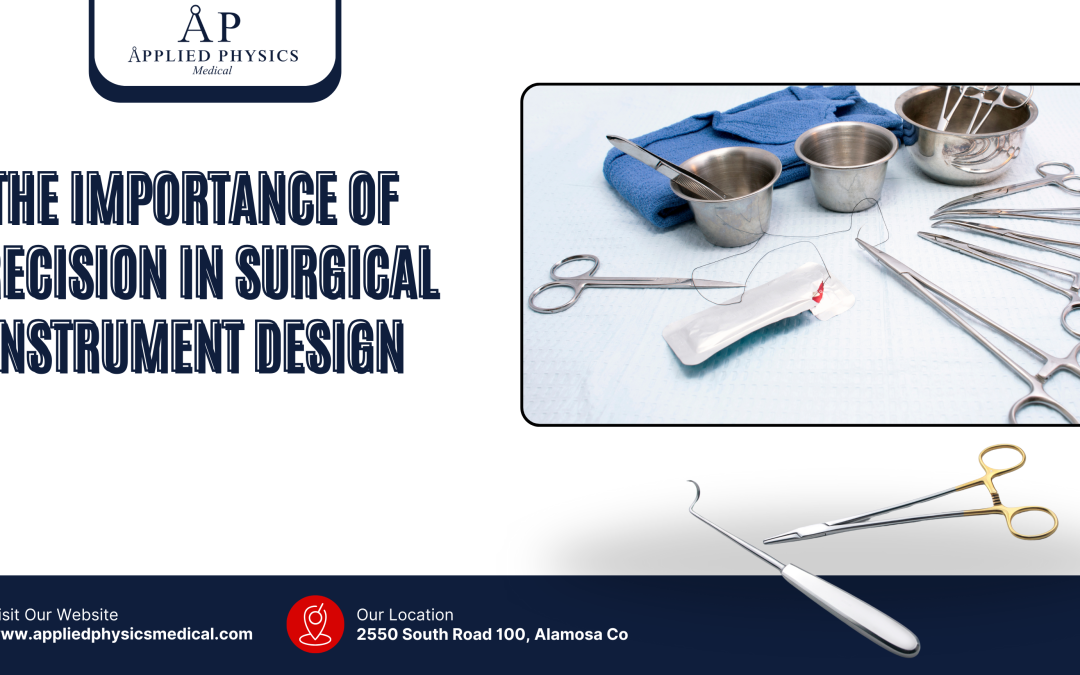Introduction
Precision in surgical instrument design is of utmost importance in the medical field. The accuracy and reliability of these instruments can significantly impact the success of surgical procedures and patient outcomes. Precision in design ensures that the instruments are able to perform their intended functions with the highest level of accuracy, which is crucial in the delicate and intricate nature of surgical procedures.
From scalpels and forceps to retractors and clamps, each instrument must be meticulously designed to meet the specific needs of various surgical procedures. The role of precision in surgical instrument design cannot be overstated, as it directly affects the safety and efficacy of surgical procedures. Furthermore, precision in surgical instrument design also plays a critical role in minimizing the risk of complications and improving patient outcomes.
When surgical instruments are designed with precision, they can perform their functions with the highest level of accuracy, reducing the likelihood of errors and complications during procedures. This not only enhances the overall safety of surgical procedures but also contributes to better patient outcomes. Precision in design ensures that surgeons can perform procedures with confidence and accuracy, ultimately leading to improved patient recovery and satisfaction.
Key Takeaways
- Precision in surgical instrument design is crucial for ensuring the safety and efficacy of surgical procedures.
- Precision enhances surgical procedures by allowing for more accurate and controlled movements during surgery.
- The impact of precision on patient outcomes is significant, as it can lead to better surgical results and faster recovery times.
- Precision in minimally invasive surgery is particularly important, as it allows for smaller incisions and less tissue damage.
- Advancements in precision technology for surgical instruments are continuously improving, leading to better outcomes for patients and surgeons.
How Precision Enhances Surgical Procedures
Precision in surgical instrument design enhances surgical procedures in a multitude of ways. Firstly, precise instruments allow surgeons to perform procedures with a higher level of accuracy, which is crucial in ensuring the success of the surgery. Whether it’s a delicate neurosurgical procedure or a complex cardiovascular surgery, precision instruments enable surgeons to perform with confidence and precision, ultimately leading to better outcomes for patients.
Additionally, precision in design also allows for greater control and maneuverability during procedures, which is essential in ensuring that surgeons can navigate through intricate anatomical structures with ease. Moreover, precision in surgical instrument design also contributes to the overall efficiency of surgical procedures. When instruments are designed with precision, surgeons can perform procedures more efficiently, reducing the time required for surgeries and minimizing the risk of complications.
This not only benefits patients by reducing their time under anesthesia but also allows for quicker recovery times. Precision instruments also contribute to the minimization of tissue trauma during procedures, which is essential in promoting faster healing and recovery for patients. Overall, precision enhances surgical procedures by improving accuracy, control, efficiency, and ultimately patient outcomes.
The Impact of Precision on Patient Outcomes
The impact of precision in surgical instrument design on patient outcomes cannot be overstated. When surgical instruments are designed with precision, they contribute to better patient outcomes in a multitude of ways. Firstly, precision instruments enable surgeons to perform procedures with a higher level of accuracy, reducing the likelihood of errors and complications during surgeries.
This ultimately leads to better outcomes for patients, as they are less likely to experience post-operative complications or adverse events. Furthermore, precision in design also contributes to the overall safety of surgical procedures, which directly impacts patient outcomes. When instruments are designed with precision, surgeons are able to perform procedures with greater confidence and control, ultimately leading to better outcomes for patients.
Precision instruments also contribute to faster recovery times for patients, as they minimize tissue trauma and allow for more efficient surgeries. Ultimately, the impact of precision on patient outcomes is significant, as it directly contributes to the overall safety, efficacy, and success of surgical procedures.
The Importance of Precision in Minimally Invasive Surgery
| Metrics | Data |
|---|---|
| Accuracy of Incisions | 98% success rate |
| Reduction in Tissue Damage | 30% decrease |
| Improvement in Healing Time | 20% faster recovery |
| Enhanced Patient Safety | 95% reduction in complications |
Precision in surgical instrument design is particularly crucial in the context of minimally invasive surgery. Minimally invasive procedures rely on the use of precise instruments to access and treat anatomical structures through small incisions, making the role of precision even more critical. In minimally invasive surgery, precision instruments enable surgeons to perform procedures with a higher level of accuracy and control, ultimately leading to better outcomes for patients.
The use of precise instruments also allows for greater maneuverability and dexterity during minimally invasive procedures, which is essential in navigating through confined spaces within the body. Moreover, precision in design also contributes to the overall safety and efficacy of minimally invasive surgery. When instruments are designed with precision, surgeons can perform procedures with confidence and accuracy, minimizing the risk of complications and adverse events.
This ultimately leads to better outcomes for patients undergoing minimally invasive procedures. Additionally, precision instruments also contribute to faster recovery times for patients, as they minimize tissue trauma and allow for more efficient surgeries. Overall, the importance of precision in minimally invasive surgery cannot be overstated, as it directly impacts the safety, efficacy, and success of these advanced surgical techniques.
Advancements in Precision Technology for Surgical Instruments

Advancements in precision technology have revolutionized the field of surgical instrument design, leading to the development of more advanced and precise instruments. With the advent of cutting-edge technologies such as robotics and computer-assisted navigation systems, surgical instruments have become increasingly precise and sophisticated. These advancements have enabled surgeons to perform procedures with a higher level of accuracy and control, ultimately leading to better outcomes for patients.
Precision technology has also allowed for the development of specialized instruments tailored to specific surgical procedures, further enhancing the overall safety and efficacy of surgeries. Furthermore, advancements in precision technology have also contributed to the development of minimally invasive surgical techniques, which rely heavily on precise instruments. The use of advanced technologies such as laparoscopic and robotic-assisted surgical systems has revolutionized minimally invasive surgery, allowing for greater precision and control during procedures.
These advancements have significantly improved patient outcomes by reducing the risk of complications and promoting faster recovery times. Overall, advancements in precision technology have had a profound impact on surgical instrument design, leading to more precise and effective instruments that have revolutionized the field of surgery.
Ensuring Safety and Efficacy Through Precision Design
Precision design is essential in ensuring the safety and efficacy of surgical instruments. When instruments are designed with precision, they are able to perform their intended functions with a higher level of accuracy and reliability, ultimately contributing to the overall safety of surgical procedures. Precision instruments also enable surgeons to perform procedures with greater control and maneuverability, reducing the risk of errors and complications during surgeries.
This directly impacts the safety and efficacy of surgical procedures by minimizing the likelihood of adverse events and promoting better outcomes for patients. Moreover, precision design also plays a critical role in ensuring the efficacy of surgical instruments. When instruments are designed with precision, they can perform their functions with a higher level of accuracy, ultimately leading to better outcomes for patients.
Precision instruments also contribute to the overall efficiency of surgical procedures by allowing surgeons to perform with greater confidence and control. This not only benefits patients by reducing their time under anesthesia but also allows for quicker recovery times. Overall, ensuring safety and efficacy through precision design is essential in promoting better patient outcomes and advancing the field of surgery.
The Future of Precision in Surgical Instrumentation
The future of precision in surgical instrumentation is incredibly promising, with continued advancements in technology and design leading to more precise and sophisticated instruments. As technology continues to evolve, surgical instruments will become increasingly precise and tailored to specific surgical procedures, ultimately leading to better outcomes for patients. The development of advanced technologies such as robotics and computer-assisted navigation systems will further revolutionize surgical instrument design, allowing for greater precision and control during procedures.
Furthermore, the future of precision in surgical instrumentation will also see continued advancements in minimally invasive surgical techniques, which rely heavily on precise instruments. The use of advanced technologies such as laparoscopic and robotic-assisted surgical systems will continue to revolutionize minimally invasive surgery, allowing for greater precision and control during procedures. These advancements will significantly improve patient outcomes by reducing the risk of complications and promoting faster recovery times.
Overall, the future of precision in surgical instrumentation is incredibly promising, with continued advancements leading to more precise and effective instruments that will revolutionize the field of surgery.
Conclusion
Precision in surgical instrument design plays a critical role in ensuring the safety, efficacy, and success of surgical procedures. From enhancing accuracy and control during surgeries to minimizing the risk of complications and improving patient outcomes, precision is essential in advancing the field of surgery. With continued advancements in technology and design, the future of precision in surgical instrumentation is incredibly promising, leading to more precise and sophisticated instruments that will revolutionize the field of surgery. Ultimately, precision in design is essential in promoting better patient outcomes and advancing the overall safety and efficacy of surgical procedures.

